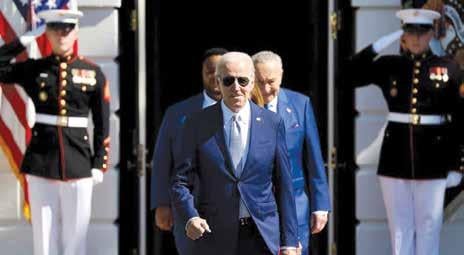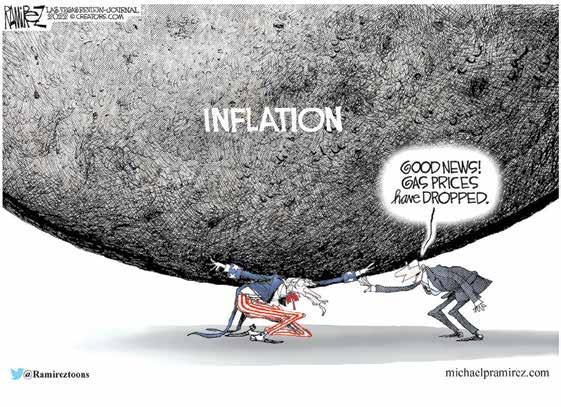
8 minute read
Israel News
tems (ATACMS) that have a range of up to 300 kilometers.
Additionally, some Western officials fear humiliation for the Kremlin might provoke an unpredictable reaction, even including tactical nuclear weapons.
9.5M Strong

Ahead of Rosh Hashana, Israel’s population stands at just over 9.5 million residents, the Central Bureau of Statistics (CBS) said in data released on Tuesday.
According to the statistics, 9.593 million people live in the country. Of those, 7.069 million (74 percent) are Jewish, 2.026 million (21%) are Arab, and 498,000 (5%) are neither.
The population is expected to reach 10 million by the end of 2024, around 15 million by 2048, and 20 million by the end of 2065.
Among Jews aged 20 and over in Israel, 45.3 percent define themselves as secular, 19.2% traditional but not very observant, 13.9% are traditional-religious, 10.7% are religious, and 10.5% are charedi.
The population of Israel grew by around 187,000 people since Rosh Hashana 2021, at a rate of 1.8%, a slight increase on last year.
Throughout the year, 177,000 babies were born in Israel.
The past year also saw the arrival of around 59,000 new immigrants to Israel — a jump compared to previous years, fueled by Russia’s invasion of Ukraine.
Life expectancy for men in Israel stood at 80.5 years and for women 84.6 years.
In 1948, when the Jewish state was established, the population of Israel numbered 806,000 people. Since then, 3.3 million people have immigrated to the country, the CBS said.
In an interview that was aired on Sunday, Iranian President Ebrahim Raisi raised eyebrows when he doubted the Holocaust.
Speaking with U.S. reporter Lesley Stahl on CBS’s “60 Minutes,” Raisi also said he couldn’t trust the United States in the nuclear talks and called Washington’s sanctions “tyrannical,” days before he headed to New York to take part in the UN General Assembly.
The interview with Raisi, who took power last year, was conducted last Tuesday at the presidential compound in Tehran.
Stahl was prepped on how to conduct herself. She had to wear a headscarf when meeting with the Iranian leader
“I was told how to dress, not to sit before he did, and not to interrupt him,” she said.
Additionally, at the end of the hourlong interview, the U.S. network’s team was surprised when “a member of Raisi’s staff reached up and blocked one of our cameramen from shooting our goodbyes.” CBS added that “another one of our cameramen’s phone was confiscated and held by President Raisi’s security team for two and a half hours.”
During the interview, Stahl asked Raisi: “Do you believe the Holocaust happened? That 6 million Jews were slaughtered?”
Raisi answered that “historical events should be investigated by researchers and historians. There are some signs that it happened. If so, they should allow it to be investigated and researched.”
Stahl then said: “So you’re not sure; I’m getting that you’re not sure.” Raisi didn’t challenge that conclusion.
Iranian leaders have a long history of Holocaust denial and Holocaust revisionism.
Asked whether he supports Israel’s right to exist, Raisi said, “You see, the


people of Palestine are the reality. This is the right of the people of Palestine who were forced to leave their houses and motherland. The Americans are supporting this false regime there to take root and to be established there.”
Asked about the Abraham Accords, which have seen multiple Arab nations normalize their ties with Jerusalem, the Iranian president replied, “If a state shakes hands with the Zionist regime, then they are also an accomplice to their crimes. And they are stabbing the very idea of Palestine in the back.”
Elsewhere during the interview, Raisi said that while his country wants “justice to be served” for the killing of its Quds Force terror chief Qassem Soleimani in a U.S. airstrike in 2020, it won’t retaliate by assassinating officials in former U.S. president Donald Trump’s administration.
“That’s the type of the actions that the Americans and Zionist regimes are doing in the world — we are not going to carry out the same actions,” he claimed, even though the U.S. government has charged a Revolutionary Guard member with planning such an assassination.
Asked about the difference between the Biden and Trump administrations, Raisi said, “The new administration in the U.S., they claim that they are different from the Trump administration. They have said it in their messages to us. But we haven’t witnessed any changes in reality.”
In response to Raisi’s Holocaust remarks, Israel’s President Isaac Herzog tweeted a photograph he said he keeps on his desk of Holocaust survivor Dora Dreiblatt Eisenberg’s forearm, tattooed with her prisoner identification number. Dreiblatt Eisenberg’s arm is shown being held by that of her infant great-granddaughter Daniella Har-Tzvi, against a background of the Israeli national flag.
“The numbers speak for themselves,” Herzog posted with the photograph.
Military chief Aviv Kohavi added, during a visit to the Nazi death camp Auschwitz in Poland, “You don’t have to be a historian or a researcher to understand the horrors of the Holocaust — you have to be a human being.
Since 2018, the Israeli slot for ambassador to Turkey has been vacant. This week, the post is being filled.
Irit Lillian, a senior diplomat who has played a key role in Israel-Turkey reconciliation, will serve as the next ambassador to Turkey, the Foreign Ministry announced this week.
Lillian has been Israel’s charge d’affaires in Ankara since February 2021, during which time both sides have moved slowly to restore full diplomatic relations.
In 2018, Turkey recalled its ambassador and asked Israel’s to leave in protest of Israel’s response to rioting on the Gaza border, in which dozens of Palestinians were killed.
Last month, the two sides announced that they would be restoring full diplomatic ties after two years of gradual rapprochement, which picked up pace noticeably this year with mutual visits by senior officials.
“From the beginning, it was clear that we were building a process in which we agree to disagree,” Lillian – who was previously Israel’s ambassador to Bulgaria and also served as acting ambassador in Australia – told The Times of Israel during an August interview.
Lillian’s appointment must now be approved by the government, and – because the country is being run by a caretaker government – Israel’s attorney general.
Prime Minister Yair Lapid is slated to meet with Turkish leader Recep Tayyip Erdogan on the sidelines of the United Nations General Assembly in New York on Tuesday. He is set to speak at the assembly on Thursday.
Lapid visited Ankara as foreign minister in June, where he met with his Turkish counterpart Mevlut Cavusoglu.



After the high-level talks aimed at cementing the countries’ rapprochement, Lapid hailed security cooperation with Turkey in helping foil an Iranian plot to kidnap or kill Israeli nationals in Istanbul.
Israel was a long-time regional ally of Turkey before a 2010 commando raid on the Gaza-bound Mavi Marmara, part of a blockade-busting flotilla, left 10 Turkish activists dead in a violent melee after they attacked Israeli soldiers who boarded the ship.
Despite an official apology by thenPrime Minister Benjamin Netanyahu, Erdogan maintained his rage, accusing the Jewish state of “keeping Hitler’s spirit alive” during Operation Defensive Shield in July 2014 and calling it a “terrorist state.”
President Isaac Herzog visited Ankara on an official trip in March and was welcomed in the capital by a full military procession.
Compensating the Victims
A U.S. court has ordered the Lebanese terror group Hezbollah to pay millions of dollars in damages to a group of joint Israeli-American citizens who sued, saying they were wounded by the group’s rockets during a war with Israel in 2006. The case was brought under the U.S.
The judge ordered Hezbollah to pay damages of $111 million to the plaintiffs.
Such civil lawsuits brought against terror groups are difficult to enforce. Still, Nitsana Darshan-Leitner, one of the lawyers representing the plaintiffs, said it was an important legal victory against the Iran-backed group.
“Only by exacting a heavy price from those who engage in the business of terrorism can we prevent the suffering and loss of additional victims to their violence,” Darshan-Leitner said in a statement.
Israel and Hezbollah fought a monthlong war in 2006. Israel pounded targets in Lebanon while Hezbollah launched thousands of rockets at cities and towns in Israel’s north.

Arab Joint List Splits

In a move that is certain to affect Israel’s upcoming elections, on Thursday, the Joint List of Arab-led parties announced that it would run in upcoming elections as two separate factions.
The decision to split into separate Hadash-Ta’al and Balad lists came just an hour before final party lists were due to the Central Elections Committee and only a day after the three factions had agreed to run again as the Joint List.
The move means that the parties will likely split votes from a fairly small pool











